Self-Reflection, Reflective Models, and Career Advancement
VerifiedAdded on 2021/04/16
|14
|4195
|186
Homework Assignment
AI Summary
This assignment delves into the significance of self-reflection and various reflective models, including Gibbs, Dewey's developmental spiral, Argyris & Schön, and Kolb's learning cycle, in fostering professional development and career advancement. The student analyzes the chosen Gibbs reflective model, highlighting its effectiveness in enhancing confidence, time management, and situational analysis skills. The assignment contrasts the student's prior approach to handling situations with the insights gained from applying the Gibbs model, emphasizing the value of structured reflection. The student explains how this new knowledge will change their practice by employing reflective assessment skills in various tasks. The assignment also discusses the six stages of Gibb's reflective cycle, including description, feelings, evaluation, analysis, conclusion, and action plan, to illustrate a structured approach to reflection. The student also reflects on the use of learning contracts and the impact of these models on career choices.
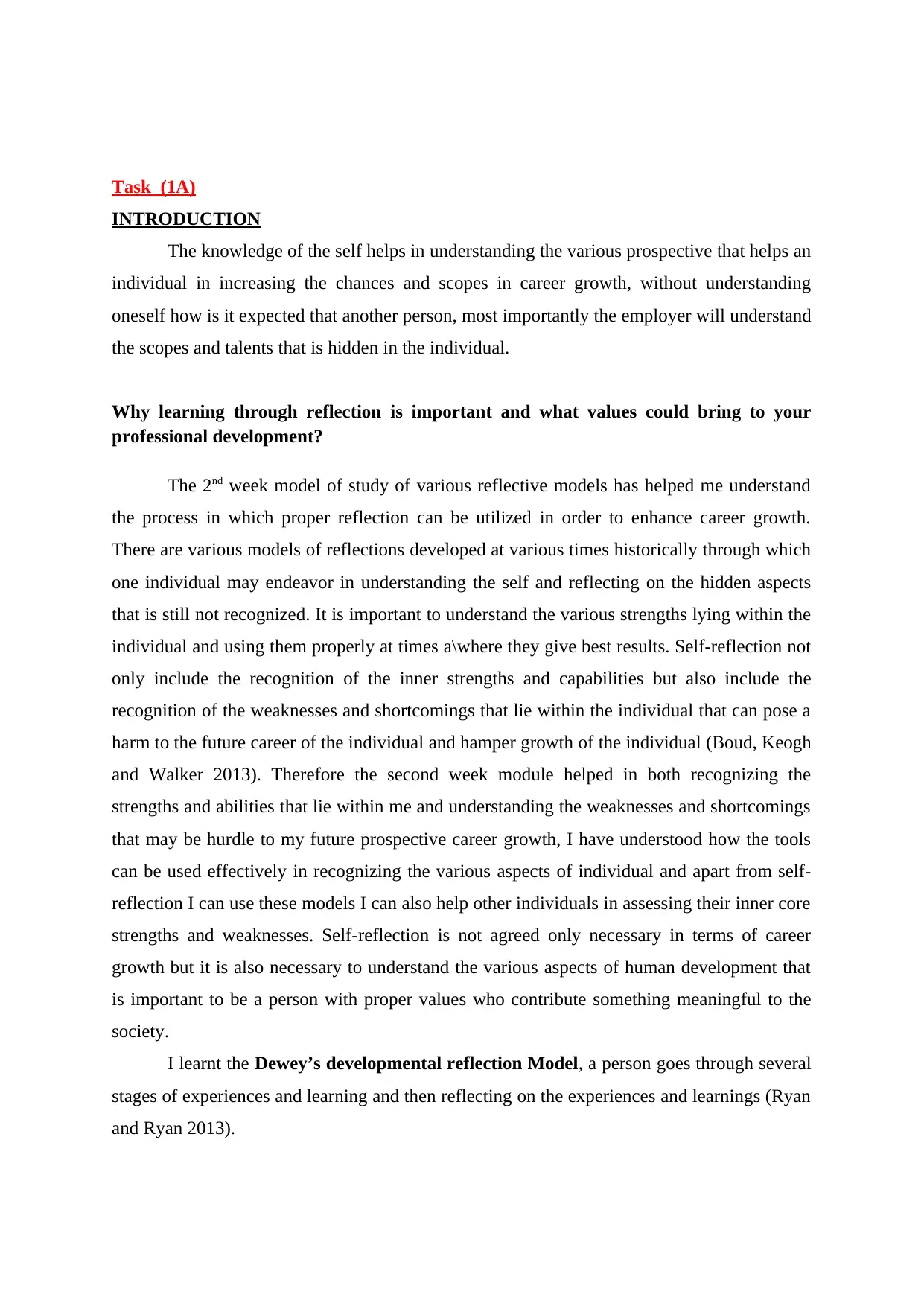
Task (1A)
INTRODUCTION
The knowledge of the self helps in understanding the various prospective that helps an
individual in increasing the chances and scopes in career growth, without understanding
oneself how is it expected that another person, most importantly the employer will understand
the scopes and talents that is hidden in the individual.
Why learning through reflection is important and what values could bring to your
professional development?
The 2nd week model of study of various reflective models has helped me understand
the process in which proper reflection can be utilized in order to enhance career growth.
There are various models of reflections developed at various times historically through which
one individual may endeavor in understanding the self and reflecting on the hidden aspects
that is still not recognized. It is important to understand the various strengths lying within the
individual and using them properly at times a\where they give best results. Self-reflection not
only include the recognition of the inner strengths and capabilities but also include the
recognition of the weaknesses and shortcomings that lie within the individual that can pose a
harm to the future career of the individual and hamper growth of the individual (Boud, Keogh
and Walker 2013). Therefore the second week module helped in both recognizing the
strengths and abilities that lie within me and understanding the weaknesses and shortcomings
that may be hurdle to my future prospective career growth, I have understood how the tools
can be used effectively in recognizing the various aspects of individual and apart from self-
reflection I can use these models I can also help other individuals in assessing their inner core
strengths and weaknesses. Self-reflection is not agreed only necessary in terms of career
growth but it is also necessary to understand the various aspects of human development that
is important to be a person with proper values who contribute something meaningful to the
society.
I learnt the Dewey’s developmental reflection Model, a person goes through several
stages of experiences and learning and then reflecting on the experiences and learnings (Ryan
and Ryan 2013).
INTRODUCTION
The knowledge of the self helps in understanding the various prospective that helps an
individual in increasing the chances and scopes in career growth, without understanding
oneself how is it expected that another person, most importantly the employer will understand
the scopes and talents that is hidden in the individual.
Why learning through reflection is important and what values could bring to your
professional development?
The 2nd week model of study of various reflective models has helped me understand
the process in which proper reflection can be utilized in order to enhance career growth.
There are various models of reflections developed at various times historically through which
one individual may endeavor in understanding the self and reflecting on the hidden aspects
that is still not recognized. It is important to understand the various strengths lying within the
individual and using them properly at times a\where they give best results. Self-reflection not
only include the recognition of the inner strengths and capabilities but also include the
recognition of the weaknesses and shortcomings that lie within the individual that can pose a
harm to the future career of the individual and hamper growth of the individual (Boud, Keogh
and Walker 2013). Therefore the second week module helped in both recognizing the
strengths and abilities that lie within me and understanding the weaknesses and shortcomings
that may be hurdle to my future prospective career growth, I have understood how the tools
can be used effectively in recognizing the various aspects of individual and apart from self-
reflection I can use these models I can also help other individuals in assessing their inner core
strengths and weaknesses. Self-reflection is not agreed only necessary in terms of career
growth but it is also necessary to understand the various aspects of human development that
is important to be a person with proper values who contribute something meaningful to the
society.
I learnt the Dewey’s developmental reflection Model, a person goes through several
stages of experiences and learning and then reflecting on the experiences and learnings (Ryan
and Ryan 2013).
Paraphrase This Document
Need a fresh take? Get an instant paraphrase of this document with our AI Paraphraser
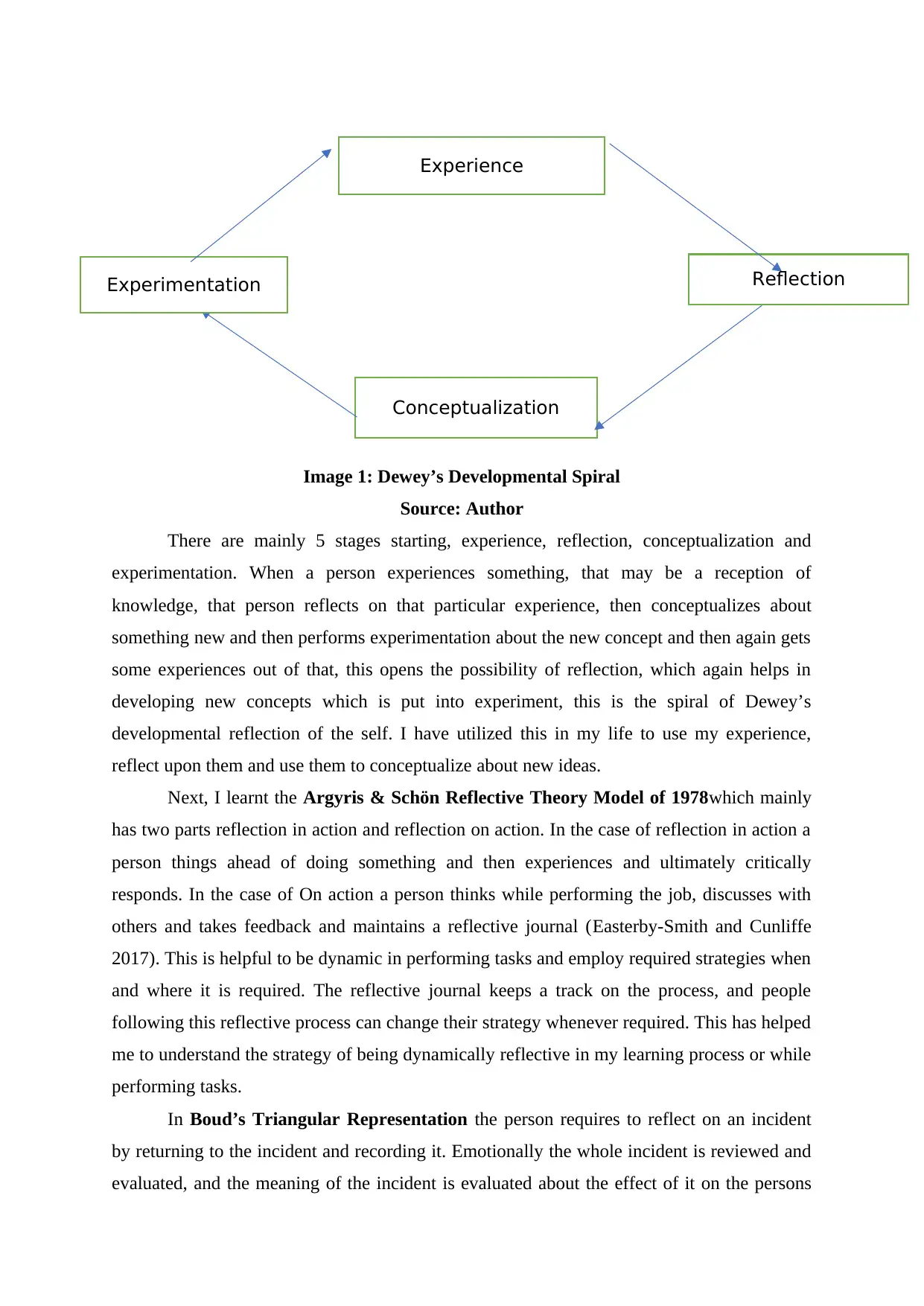
Image 1: Dewey’s Developmental Spiral
Source: Author
There are mainly 5 stages starting, experience, reflection, conceptualization and
experimentation. When a person experiences something, that may be a reception of
knowledge, that person reflects on that particular experience, then conceptualizes about
something new and then performs experimentation about the new concept and then again gets
some experiences out of that, this opens the possibility of reflection, which again helps in
developing new concepts which is put into experiment, this is the spiral of Dewey’s
developmental reflection of the self. I have utilized this in my life to use my experience,
reflect upon them and use them to conceptualize about new ideas.
Next, I learnt the Argyris & Schön Reflective Theory Model of 1978which mainly
has two parts reflection in action and reflection on action. In the case of reflection in action a
person things ahead of doing something and then experiences and ultimately critically
responds. In the case of On action a person thinks while performing the job, discusses with
others and takes feedback and maintains a reflective journal (Easterby-Smith and Cunliffe
2017). This is helpful to be dynamic in performing tasks and employ required strategies when
and where it is required. The reflective journal keeps a track on the process, and people
following this reflective process can change their strategy whenever required. This has helped
me to understand the strategy of being dynamically reflective in my learning process or while
performing tasks.
In Boud’s Triangular Representation the person requires to reflect on an incident
by returning to the incident and recording it. Emotionally the whole incident is reviewed and
evaluated, and the meaning of the incident is evaluated about the effect of it on the persons
Experience
Experimentation Reflection
Conceptualization
Source: Author
There are mainly 5 stages starting, experience, reflection, conceptualization and
experimentation. When a person experiences something, that may be a reception of
knowledge, that person reflects on that particular experience, then conceptualizes about
something new and then performs experimentation about the new concept and then again gets
some experiences out of that, this opens the possibility of reflection, which again helps in
developing new concepts which is put into experiment, this is the spiral of Dewey’s
developmental reflection of the self. I have utilized this in my life to use my experience,
reflect upon them and use them to conceptualize about new ideas.
Next, I learnt the Argyris & Schön Reflective Theory Model of 1978which mainly
has two parts reflection in action and reflection on action. In the case of reflection in action a
person things ahead of doing something and then experiences and ultimately critically
responds. In the case of On action a person thinks while performing the job, discusses with
others and takes feedback and maintains a reflective journal (Easterby-Smith and Cunliffe
2017). This is helpful to be dynamic in performing tasks and employ required strategies when
and where it is required. The reflective journal keeps a track on the process, and people
following this reflective process can change their strategy whenever required. This has helped
me to understand the strategy of being dynamically reflective in my learning process or while
performing tasks.
In Boud’s Triangular Representation the person requires to reflect on an incident
by returning to the incident and recording it. Emotionally the whole incident is reviewed and
evaluated, and the meaning of the incident is evaluated about the effect of it on the persons
Experience
Experimentation Reflection
Conceptualization
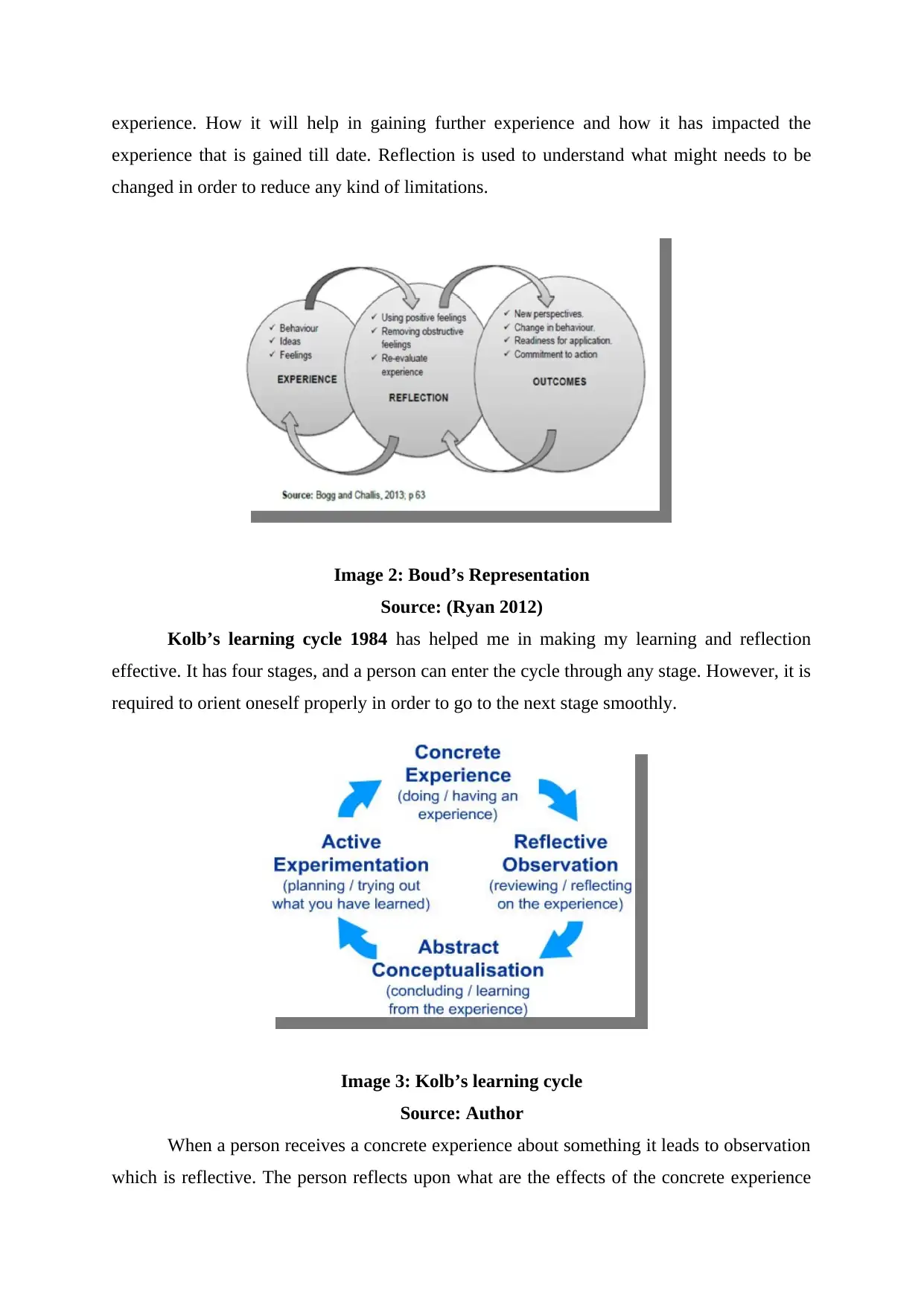
experience. How it will help in gaining further experience and how it has impacted the
experience that is gained till date. Reflection is used to understand what might needs to be
changed in order to reduce any kind of limitations.
Image 2: Boud’s Representation
Source: (Ryan 2012)
Kolb’s learning cycle 1984 has helped me in making my learning and reflection
effective. It has four stages, and a person can enter the cycle through any stage. However, it is
required to orient oneself properly in order to go to the next stage smoothly.
Image 3: Kolb’s learning cycle
Source: Author
When a person receives a concrete experience about something it leads to observation
which is reflective. The person reflects upon what are the effects of the concrete experience
experience that is gained till date. Reflection is used to understand what might needs to be
changed in order to reduce any kind of limitations.
Image 2: Boud’s Representation
Source: (Ryan 2012)
Kolb’s learning cycle 1984 has helped me in making my learning and reflection
effective. It has four stages, and a person can enter the cycle through any stage. However, it is
required to orient oneself properly in order to go to the next stage smoothly.
Image 3: Kolb’s learning cycle
Source: Author
When a person receives a concrete experience about something it leads to observation
which is reflective. The person reflects upon what are the effects of the concrete experience
⊘ This is a preview!⊘
Do you want full access?
Subscribe today to unlock all pages.

Trusted by 1+ million students worldwide
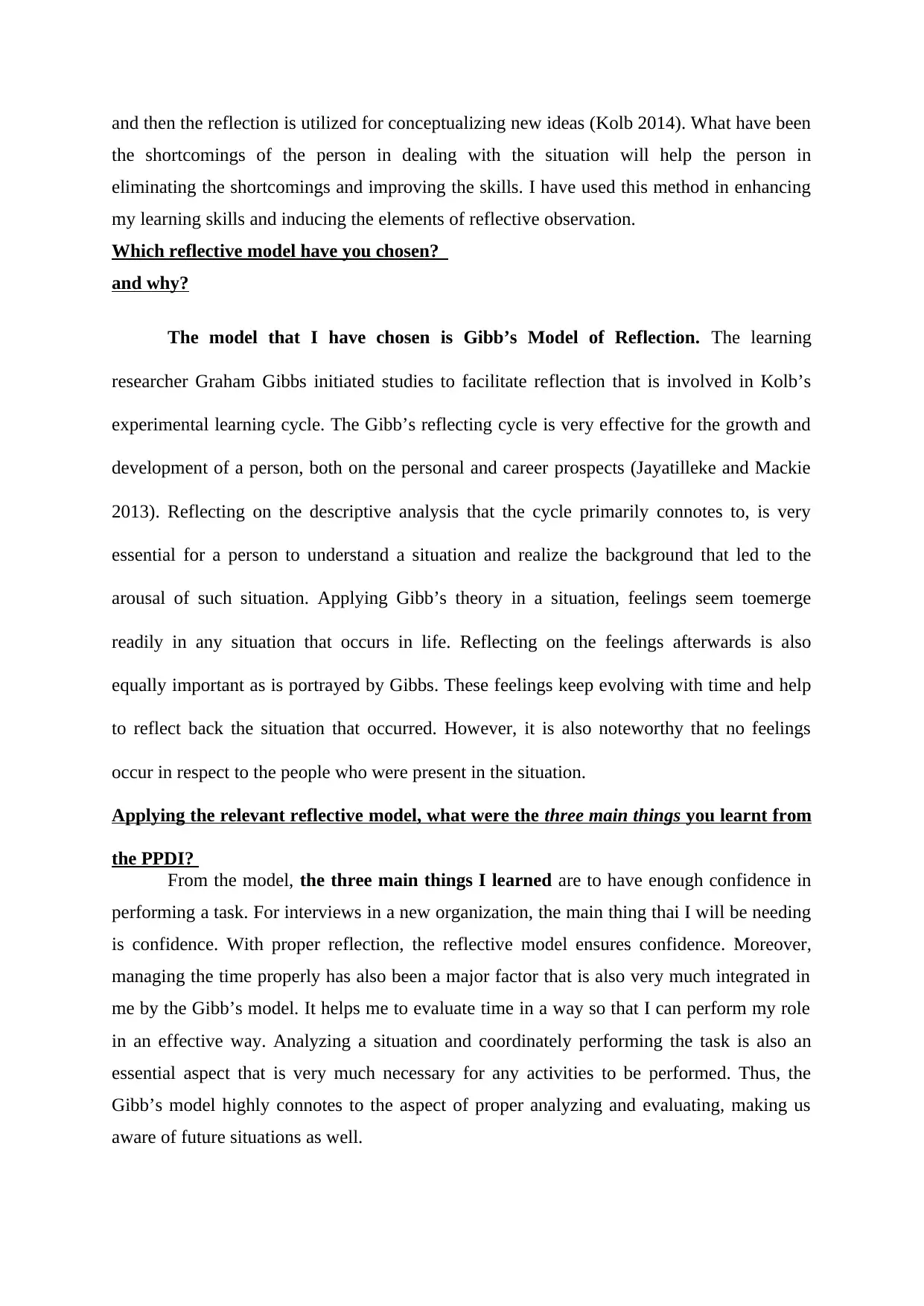
and then the reflection is utilized for conceptualizing new ideas (Kolb 2014). What have been
the shortcomings of the person in dealing with the situation will help the person in
eliminating the shortcomings and improving the skills. I have used this method in enhancing
my learning skills and inducing the elements of reflective observation.
Which reflective model have you chosen?
and why?
The model that I have chosen is Gibb’s Model of Reflection. The learning
researcher Graham Gibbs initiated studies to facilitate reflection that is involved in Kolb’s
experimental learning cycle. The Gibb’s reflecting cycle is very effective for the growth and
development of a person, both on the personal and career prospects (Jayatilleke and Mackie
2013). Reflecting on the descriptive analysis that the cycle primarily connotes to, is very
essential for a person to understand a situation and realize the background that led to the
arousal of such situation. Applying Gibb’s theory in a situation, feelings seem toemerge
readily in any situation that occurs in life. Reflecting on the feelings afterwards is also
equally important as is portrayed by Gibbs. These feelings keep evolving with time and help
to reflect back the situation that occurred. However, it is also noteworthy that no feelings
occur in respect to the people who were present in the situation.
Applying the relevant reflective model, what were the three main things you learnt from
the PPDI?
From the model, the three main things I learned are to have enough confidence in
performing a task. For interviews in a new organization, the main thing thai I will be needing
is confidence. With proper reflection, the reflective model ensures confidence. Moreover,
managing the time properly has also been a major factor that is also very much integrated in
me by the Gibb’s model. It helps me to evaluate time in a way so that I can perform my role
in an effective way. Analyzing a situation and coordinately performing the task is also an
essential aspect that is very much necessary for any activities to be performed. Thus, the
Gibb’s model highly connotes to the aspect of proper analyzing and evaluating, making us
aware of future situations as well.
the shortcomings of the person in dealing with the situation will help the person in
eliminating the shortcomings and improving the skills. I have used this method in enhancing
my learning skills and inducing the elements of reflective observation.
Which reflective model have you chosen?
and why?
The model that I have chosen is Gibb’s Model of Reflection. The learning
researcher Graham Gibbs initiated studies to facilitate reflection that is involved in Kolb’s
experimental learning cycle. The Gibb’s reflecting cycle is very effective for the growth and
development of a person, both on the personal and career prospects (Jayatilleke and Mackie
2013). Reflecting on the descriptive analysis that the cycle primarily connotes to, is very
essential for a person to understand a situation and realize the background that led to the
arousal of such situation. Applying Gibb’s theory in a situation, feelings seem toemerge
readily in any situation that occurs in life. Reflecting on the feelings afterwards is also
equally important as is portrayed by Gibbs. These feelings keep evolving with time and help
to reflect back the situation that occurred. However, it is also noteworthy that no feelings
occur in respect to the people who were present in the situation.
Applying the relevant reflective model, what were the three main things you learnt from
the PPDI?
From the model, the three main things I learned are to have enough confidence in
performing a task. For interviews in a new organization, the main thing thai I will be needing
is confidence. With proper reflection, the reflective model ensures confidence. Moreover,
managing the time properly has also been a major factor that is also very much integrated in
me by the Gibb’s model. It helps me to evaluate time in a way so that I can perform my role
in an effective way. Analyzing a situation and coordinately performing the task is also an
essential aspect that is very much necessary for any activities to be performed. Thus, the
Gibb’s model highly connotes to the aspect of proper analyzing and evaluating, making us
aware of future situations as well.
Paraphrase This Document
Need a fresh take? Get an instant paraphrase of this document with our AI Paraphraser
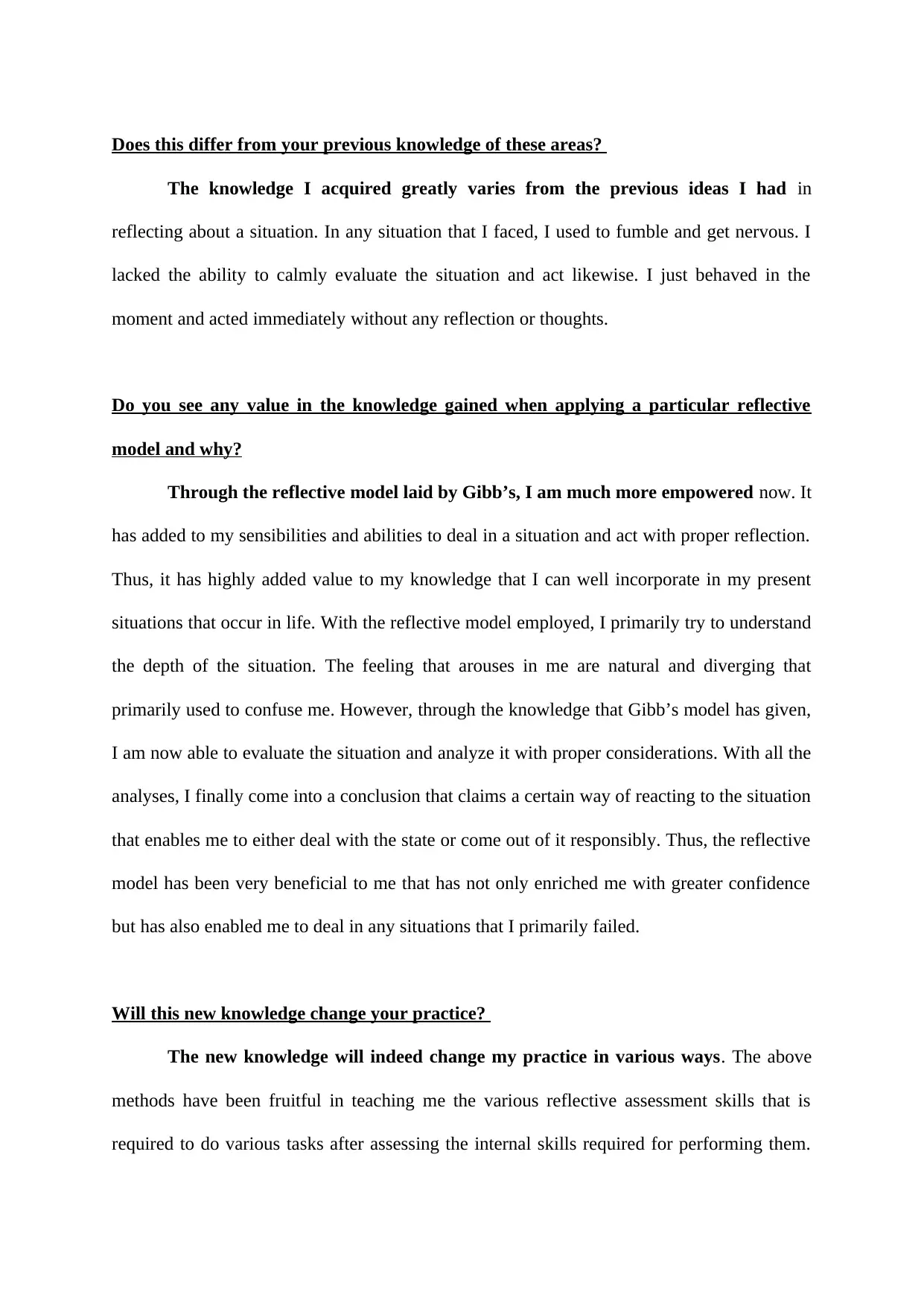
Does this differ from your previous knowledge of these areas?
The knowledge I acquired greatly varies from the previous ideas I had in
reflecting about a situation. In any situation that I faced, I used to fumble and get nervous. I
lacked the ability to calmly evaluate the situation and act likewise. I just behaved in the
moment and acted immediately without any reflection or thoughts.
Do you see any value in the knowledge gained when applying a particular reflective
model and why?
Through the reflective model laid by Gibb’s, I am much more empowered now. It
has added to my sensibilities and abilities to deal in a situation and act with proper reflection.
Thus, it has highly added value to my knowledge that I can well incorporate in my present
situations that occur in life. With the reflective model employed, I primarily try to understand
the depth of the situation. The feeling that arouses in me are natural and diverging that
primarily used to confuse me. However, through the knowledge that Gibb’s model has given,
I am now able to evaluate the situation and analyze it with proper considerations. With all the
analyses, I finally come into a conclusion that claims a certain way of reacting to the situation
that enables me to either deal with the state or come out of it responsibly. Thus, the reflective
model has been very beneficial to me that has not only enriched me with greater confidence
but has also enabled me to deal in any situations that I primarily failed.
Will this new knowledge change your practice?
The new knowledge will indeed change my practice in various ways. The above
methods have been fruitful in teaching me the various reflective assessment skills that is
required to do various tasks after assessing the internal skills required for performing them.
The knowledge I acquired greatly varies from the previous ideas I had in
reflecting about a situation. In any situation that I faced, I used to fumble and get nervous. I
lacked the ability to calmly evaluate the situation and act likewise. I just behaved in the
moment and acted immediately without any reflection or thoughts.
Do you see any value in the knowledge gained when applying a particular reflective
model and why?
Through the reflective model laid by Gibb’s, I am much more empowered now. It
has added to my sensibilities and abilities to deal in a situation and act with proper reflection.
Thus, it has highly added value to my knowledge that I can well incorporate in my present
situations that occur in life. With the reflective model employed, I primarily try to understand
the depth of the situation. The feeling that arouses in me are natural and diverging that
primarily used to confuse me. However, through the knowledge that Gibb’s model has given,
I am now able to evaluate the situation and analyze it with proper considerations. With all the
analyses, I finally come into a conclusion that claims a certain way of reacting to the situation
that enables me to either deal with the state or come out of it responsibly. Thus, the reflective
model has been very beneficial to me that has not only enriched me with greater confidence
but has also enabled me to deal in any situations that I primarily failed.
Will this new knowledge change your practice?
The new knowledge will indeed change my practice in various ways. The above
methods have been fruitful in teaching me the various reflective assessment skills that is
required to do various tasks after assessing the internal skills required for performing them.
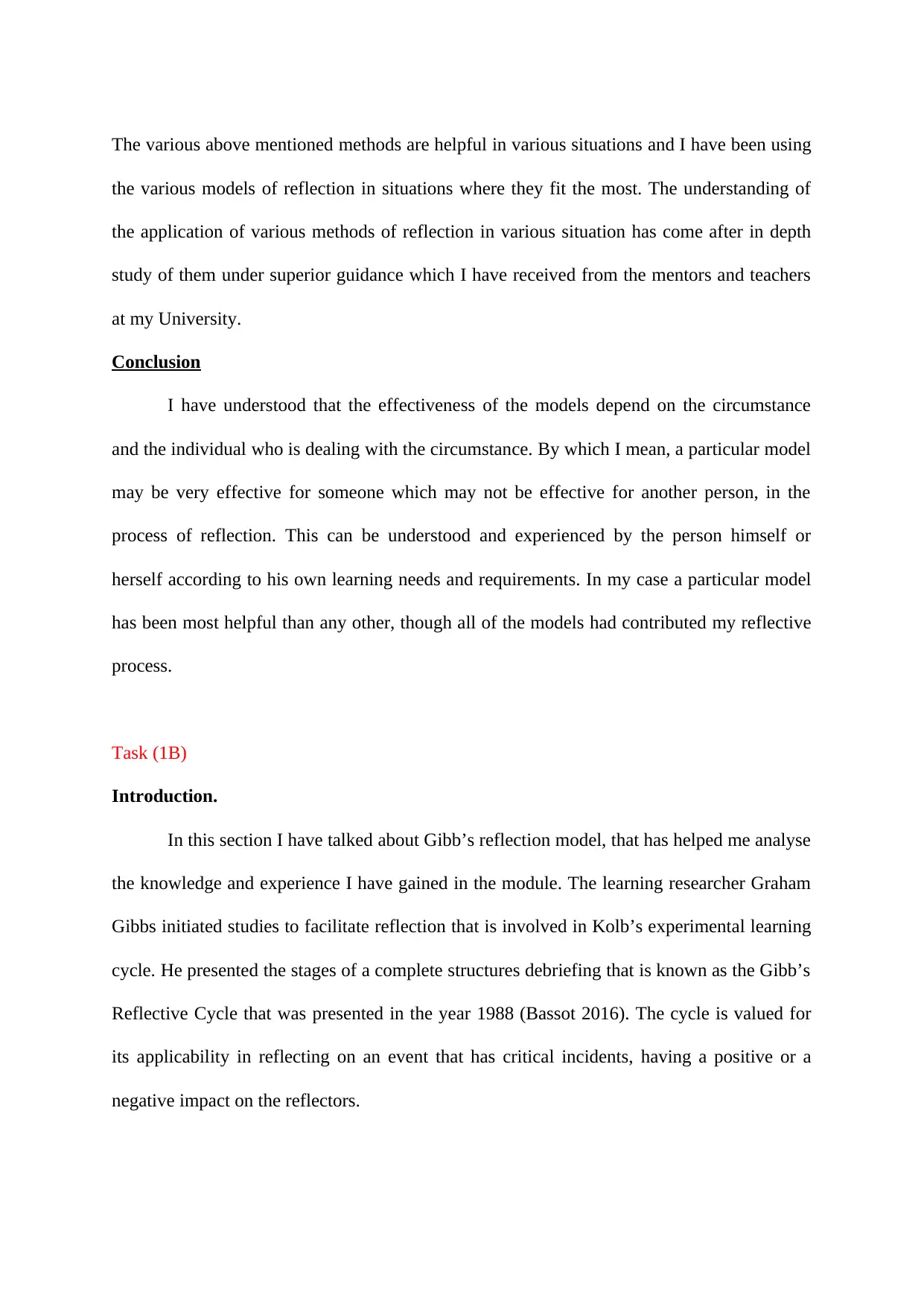
The various above mentioned methods are helpful in various situations and I have been using
the various models of reflection in situations where they fit the most. The understanding of
the application of various methods of reflection in various situation has come after in depth
study of them under superior guidance which I have received from the mentors and teachers
at my University.
Conclusion
I have understood that the effectiveness of the models depend on the circumstance
and the individual who is dealing with the circumstance. By which I mean, a particular model
may be very effective for someone which may not be effective for another person, in the
process of reflection. This can be understood and experienced by the person himself or
herself according to his own learning needs and requirements. In my case a particular model
has been most helpful than any other, though all of the models had contributed my reflective
process.
Task (1B)
Introduction.
In this section I have talked about Gibb’s reflection model, that has helped me analyse
the knowledge and experience I have gained in the module. The learning researcher Graham
Gibbs initiated studies to facilitate reflection that is involved in Kolb’s experimental learning
cycle. He presented the stages of a complete structures debriefing that is known as the Gibb’s
Reflective Cycle that was presented in the year 1988 (Bassot 2016). The cycle is valued for
its applicability in reflecting on an event that has critical incidents, having a positive or a
negative impact on the reflectors.
the various models of reflection in situations where they fit the most. The understanding of
the application of various methods of reflection in various situation has come after in depth
study of them under superior guidance which I have received from the mentors and teachers
at my University.
Conclusion
I have understood that the effectiveness of the models depend on the circumstance
and the individual who is dealing with the circumstance. By which I mean, a particular model
may be very effective for someone which may not be effective for another person, in the
process of reflection. This can be understood and experienced by the person himself or
herself according to his own learning needs and requirements. In my case a particular model
has been most helpful than any other, though all of the models had contributed my reflective
process.
Task (1B)
Introduction.
In this section I have talked about Gibb’s reflection model, that has helped me analyse
the knowledge and experience I have gained in the module. The learning researcher Graham
Gibbs initiated studies to facilitate reflection that is involved in Kolb’s experimental learning
cycle. He presented the stages of a complete structures debriefing that is known as the Gibb’s
Reflective Cycle that was presented in the year 1988 (Bassot 2016). The cycle is valued for
its applicability in reflecting on an event that has critical incidents, having a positive or a
negative impact on the reflectors.
⊘ This is a preview!⊘
Do you want full access?
Subscribe today to unlock all pages.

Trusted by 1+ million students worldwide
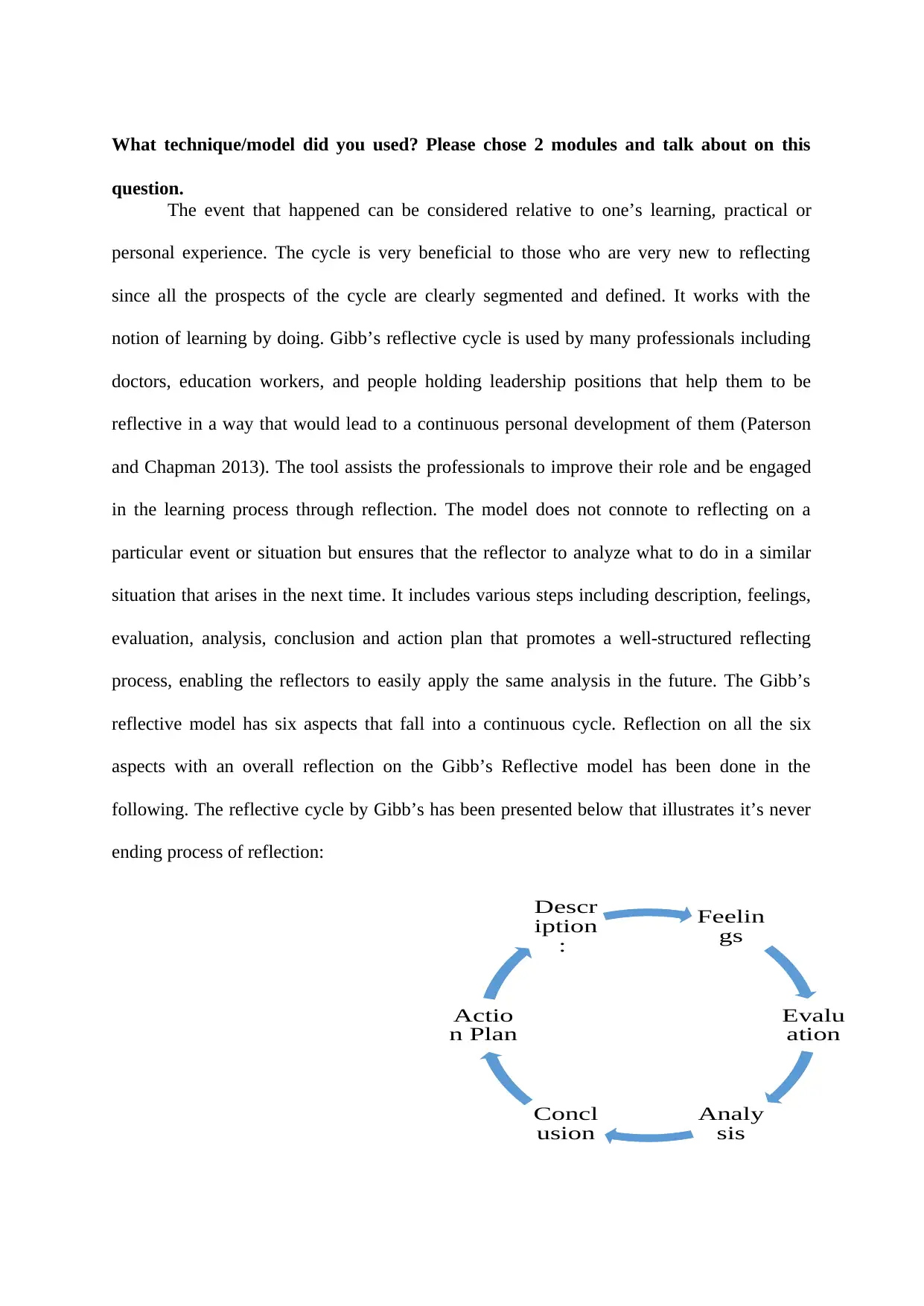
What technique/model did you used? Please chose 2 modules and talk about on this
question.
The event that happened can be considered relative to one’s learning, practical or
personal experience. The cycle is very beneficial to those who are very new to reflecting
since all the prospects of the cycle are clearly segmented and defined. It works with the
notion of learning by doing. Gibb’s reflective cycle is used by many professionals including
doctors, education workers, and people holding leadership positions that help them to be
reflective in a way that would lead to a continuous personal development of them (Paterson
and Chapman 2013). The tool assists the professionals to improve their role and be engaged
in the learning process through reflection. The model does not connote to reflecting on a
particular event or situation but ensures that the reflector to analyze what to do in a similar
situation that arises in the next time. It includes various steps including description, feelings,
evaluation, analysis, conclusion and action plan that promotes a well-structured reflecting
process, enabling the reflectors to easily apply the same analysis in the future. The Gibb’s
reflective model has six aspects that fall into a continuous cycle. Reflection on all the six
aspects with an overall reflection on the Gibb’s Reflective model has been done in the
following. The reflective cycle by Gibb’s has been presented below that illustrates it’s never
ending process of reflection:
Feelin
gs
Evalu
ation
Analy
sis
Concl
usion
Actio
n Plan
Descr
iption
:
question.
The event that happened can be considered relative to one’s learning, practical or
personal experience. The cycle is very beneficial to those who are very new to reflecting
since all the prospects of the cycle are clearly segmented and defined. It works with the
notion of learning by doing. Gibb’s reflective cycle is used by many professionals including
doctors, education workers, and people holding leadership positions that help them to be
reflective in a way that would lead to a continuous personal development of them (Paterson
and Chapman 2013). The tool assists the professionals to improve their role and be engaged
in the learning process through reflection. The model does not connote to reflecting on a
particular event or situation but ensures that the reflector to analyze what to do in a similar
situation that arises in the next time. It includes various steps including description, feelings,
evaluation, analysis, conclusion and action plan that promotes a well-structured reflecting
process, enabling the reflectors to easily apply the same analysis in the future. The Gibb’s
reflective model has six aspects that fall into a continuous cycle. Reflection on all the six
aspects with an overall reflection on the Gibb’s Reflective model has been done in the
following. The reflective cycle by Gibb’s has been presented below that illustrates it’s never
ending process of reflection:
Feelin
gs
Evalu
ation
Analy
sis
Concl
usion
Actio
n Plan
Descr
iption
:
Paraphrase This Document
Need a fresh take? Get an instant paraphrase of this document with our AI Paraphraser
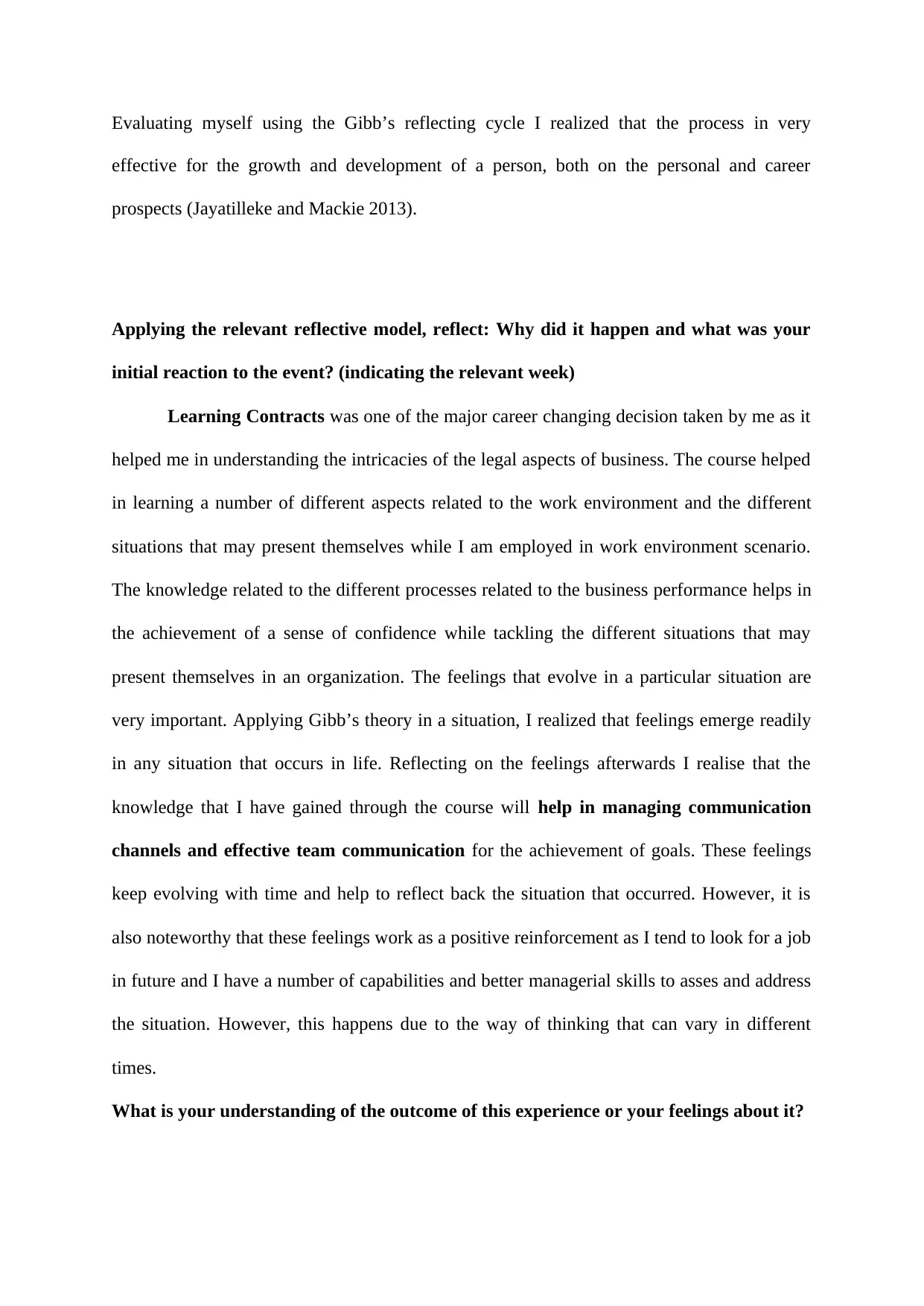
Evaluating myself using the Gibb’s reflecting cycle I realized that the process in very
effective for the growth and development of a person, both on the personal and career
prospects (Jayatilleke and Mackie 2013).
Applying the relevant reflective model, reflect: Why did it happen and what was your
initial reaction to the event? (indicating the relevant week)
Learning Contracts was one of the major career changing decision taken by me as it
helped me in understanding the intricacies of the legal aspects of business. The course helped
in learning a number of different aspects related to the work environment and the different
situations that may present themselves while I am employed in work environment scenario.
The knowledge related to the different processes related to the business performance helps in
the achievement of a sense of confidence while tackling the different situations that may
present themselves in an organization. The feelings that evolve in a particular situation are
very important. Applying Gibb’s theory in a situation, I realized that feelings emerge readily
in any situation that occurs in life. Reflecting on the feelings afterwards I realise that the
knowledge that I have gained through the course will help in managing communication
channels and effective team communication for the achievement of goals. These feelings
keep evolving with time and help to reflect back the situation that occurred. However, it is
also noteworthy that these feelings work as a positive reinforcement as I tend to look for a job
in future and I have a number of capabilities and better managerial skills to asses and address
the situation. However, this happens due to the way of thinking that can vary in different
times.
What is your understanding of the outcome of this experience or your feelings about it?
effective for the growth and development of a person, both on the personal and career
prospects (Jayatilleke and Mackie 2013).
Applying the relevant reflective model, reflect: Why did it happen and what was your
initial reaction to the event? (indicating the relevant week)
Learning Contracts was one of the major career changing decision taken by me as it
helped me in understanding the intricacies of the legal aspects of business. The course helped
in learning a number of different aspects related to the work environment and the different
situations that may present themselves while I am employed in work environment scenario.
The knowledge related to the different processes related to the business performance helps in
the achievement of a sense of confidence while tackling the different situations that may
present themselves in an organization. The feelings that evolve in a particular situation are
very important. Applying Gibb’s theory in a situation, I realized that feelings emerge readily
in any situation that occurs in life. Reflecting on the feelings afterwards I realise that the
knowledge that I have gained through the course will help in managing communication
channels and effective team communication for the achievement of goals. These feelings
keep evolving with time and help to reflect back the situation that occurred. However, it is
also noteworthy that these feelings work as a positive reinforcement as I tend to look for a job
in future and I have a number of capabilities and better managerial skills to asses and address
the situation. However, this happens due to the way of thinking that can vary in different
times.
What is your understanding of the outcome of this experience or your feelings about it?
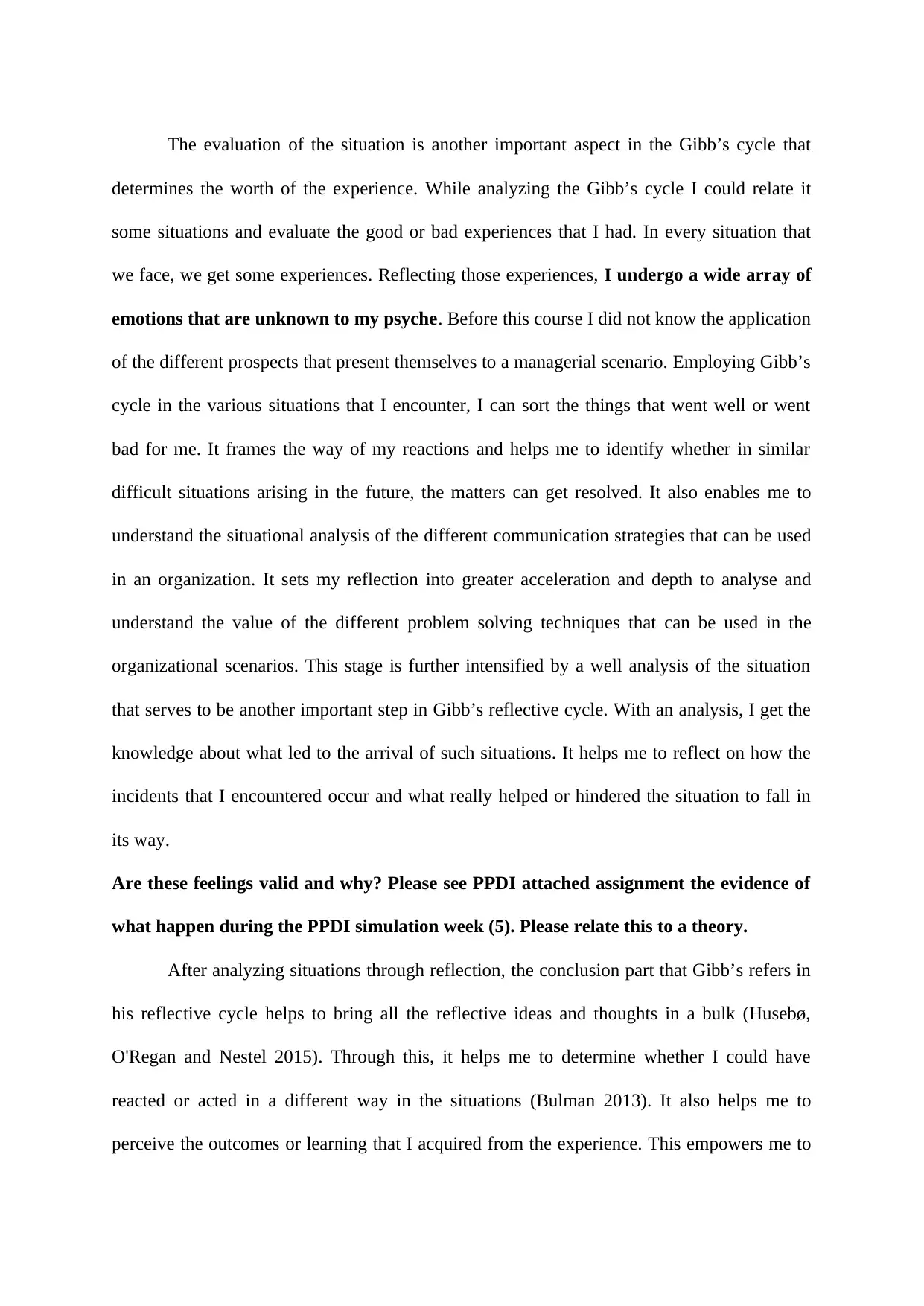
The evaluation of the situation is another important aspect in the Gibb’s cycle that
determines the worth of the experience. While analyzing the Gibb’s cycle I could relate it
some situations and evaluate the good or bad experiences that I had. In every situation that
we face, we get some experiences. Reflecting those experiences, I undergo a wide array of
emotions that are unknown to my psyche. Before this course I did not know the application
of the different prospects that present themselves to a managerial scenario. Employing Gibb’s
cycle in the various situations that I encounter, I can sort the things that went well or went
bad for me. It frames the way of my reactions and helps me to identify whether in similar
difficult situations arising in the future, the matters can get resolved. It also enables me to
understand the situational analysis of the different communication strategies that can be used
in an organization. It sets my reflection into greater acceleration and depth to analyse and
understand the value of the different problem solving techniques that can be used in the
organizational scenarios. This stage is further intensified by a well analysis of the situation
that serves to be another important step in Gibb’s reflective cycle. With an analysis, I get the
knowledge about what led to the arrival of such situations. It helps me to reflect on how the
incidents that I encountered occur and what really helped or hindered the situation to fall in
its way.
Are these feelings valid and why? Please see PPDI attached assignment the evidence of
what happen during the PPDI simulation week (5). Please relate this to a theory.
After analyzing situations through reflection, the conclusion part that Gibb’s refers in
his reflective cycle helps to bring all the reflective ideas and thoughts in a bulk (Husebø,
O'Regan and Nestel 2015). Through this, it helps me to determine whether I could have
reacted or acted in a different way in the situations (Bulman 2013). It also helps me to
perceive the outcomes or learning that I acquired from the experience. This empowers me to
determines the worth of the experience. While analyzing the Gibb’s cycle I could relate it
some situations and evaluate the good or bad experiences that I had. In every situation that
we face, we get some experiences. Reflecting those experiences, I undergo a wide array of
emotions that are unknown to my psyche. Before this course I did not know the application
of the different prospects that present themselves to a managerial scenario. Employing Gibb’s
cycle in the various situations that I encounter, I can sort the things that went well or went
bad for me. It frames the way of my reactions and helps me to identify whether in similar
difficult situations arising in the future, the matters can get resolved. It also enables me to
understand the situational analysis of the different communication strategies that can be used
in an organization. It sets my reflection into greater acceleration and depth to analyse and
understand the value of the different problem solving techniques that can be used in the
organizational scenarios. This stage is further intensified by a well analysis of the situation
that serves to be another important step in Gibb’s reflective cycle. With an analysis, I get the
knowledge about what led to the arrival of such situations. It helps me to reflect on how the
incidents that I encountered occur and what really helped or hindered the situation to fall in
its way.
Are these feelings valid and why? Please see PPDI attached assignment the evidence of
what happen during the PPDI simulation week (5). Please relate this to a theory.
After analyzing situations through reflection, the conclusion part that Gibb’s refers in
his reflective cycle helps to bring all the reflective ideas and thoughts in a bulk (Husebø,
O'Regan and Nestel 2015). Through this, it helps me to determine whether I could have
reacted or acted in a different way in the situations (Bulman 2013). It also helps me to
perceive the outcomes or learning that I acquired from the experience. This empowers me to
⊘ This is a preview!⊘
Do you want full access?
Subscribe today to unlock all pages.

Trusted by 1+ million students worldwide
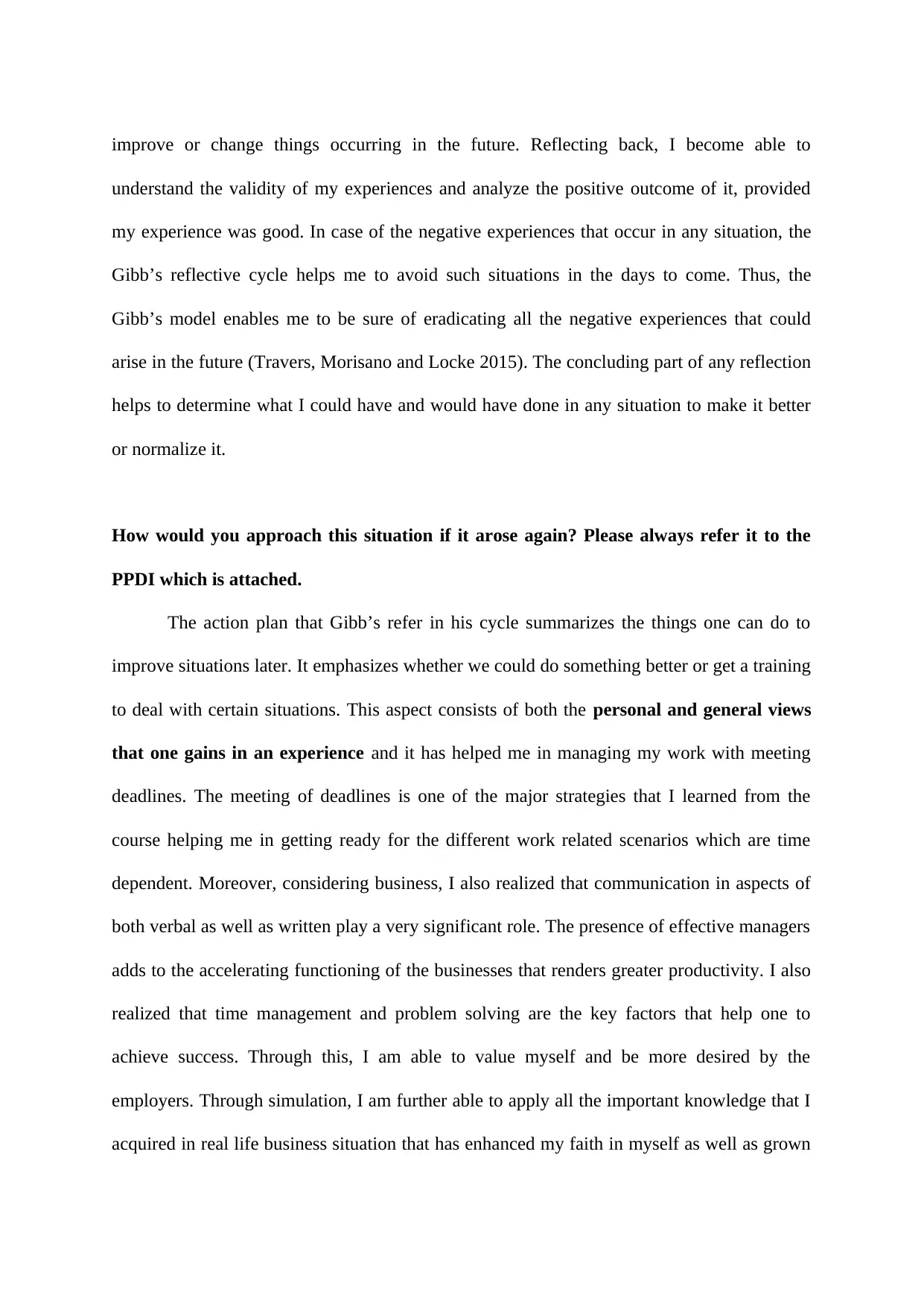
improve or change things occurring in the future. Reflecting back, I become able to
understand the validity of my experiences and analyze the positive outcome of it, provided
my experience was good. In case of the negative experiences that occur in any situation, the
Gibb’s reflective cycle helps me to avoid such situations in the days to come. Thus, the
Gibb’s model enables me to be sure of eradicating all the negative experiences that could
arise in the future (Travers, Morisano and Locke 2015). The concluding part of any reflection
helps to determine what I could have and would have done in any situation to make it better
or normalize it.
How would you approach this situation if it arose again? Please always refer it to the
PPDI which is attached.
The action plan that Gibb’s refer in his cycle summarizes the things one can do to
improve situations later. It emphasizes whether we could do something better or get a training
to deal with certain situations. This aspect consists of both the personal and general views
that one gains in an experience and it has helped me in managing my work with meeting
deadlines. The meeting of deadlines is one of the major strategies that I learned from the
course helping me in getting ready for the different work related scenarios which are time
dependent. Moreover, considering business, I also realized that communication in aspects of
both verbal as well as written play a very significant role. The presence of effective managers
adds to the accelerating functioning of the businesses that renders greater productivity. I also
realized that time management and problem solving are the key factors that help one to
achieve success. Through this, I am able to value myself and be more desired by the
employers. Through simulation, I am further able to apply all the important knowledge that I
acquired in real life business situation that has enhanced my faith in myself as well as grown
understand the validity of my experiences and analyze the positive outcome of it, provided
my experience was good. In case of the negative experiences that occur in any situation, the
Gibb’s reflective cycle helps me to avoid such situations in the days to come. Thus, the
Gibb’s model enables me to be sure of eradicating all the negative experiences that could
arise in the future (Travers, Morisano and Locke 2015). The concluding part of any reflection
helps to determine what I could have and would have done in any situation to make it better
or normalize it.
How would you approach this situation if it arose again? Please always refer it to the
PPDI which is attached.
The action plan that Gibb’s refer in his cycle summarizes the things one can do to
improve situations later. It emphasizes whether we could do something better or get a training
to deal with certain situations. This aspect consists of both the personal and general views
that one gains in an experience and it has helped me in managing my work with meeting
deadlines. The meeting of deadlines is one of the major strategies that I learned from the
course helping me in getting ready for the different work related scenarios which are time
dependent. Moreover, considering business, I also realized that communication in aspects of
both verbal as well as written play a very significant role. The presence of effective managers
adds to the accelerating functioning of the businesses that renders greater productivity. I also
realized that time management and problem solving are the key factors that help one to
achieve success. Through this, I am able to value myself and be more desired by the
employers. Through simulation, I am further able to apply all the important knowledge that I
acquired in real life business situation that has enhanced my faith in myself as well as grown
Paraphrase This Document
Need a fresh take? Get an instant paraphrase of this document with our AI Paraphraser
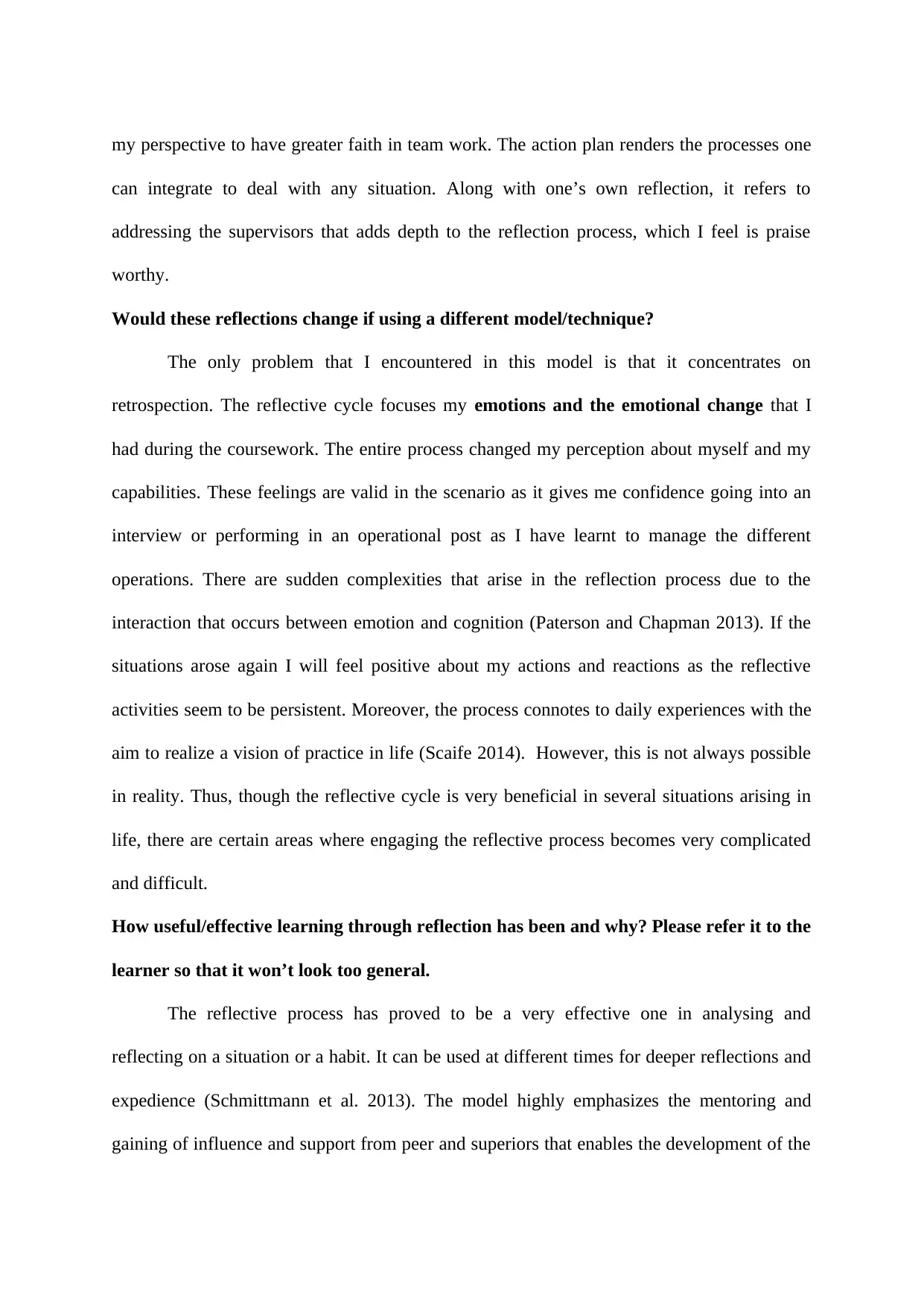
my perspective to have greater faith in team work. The action plan renders the processes one
can integrate to deal with any situation. Along with one’s own reflection, it refers to
addressing the supervisors that adds depth to the reflection process, which I feel is praise
worthy.
Would these reflections change if using a different model/technique?
The only problem that I encountered in this model is that it concentrates on
retrospection. The reflective cycle focuses my emotions and the emotional change that I
had during the coursework. The entire process changed my perception about myself and my
capabilities. These feelings are valid in the scenario as it gives me confidence going into an
interview or performing in an operational post as I have learnt to manage the different
operations. There are sudden complexities that arise in the reflection process due to the
interaction that occurs between emotion and cognition (Paterson and Chapman 2013). If the
situations arose again I will feel positive about my actions and reactions as the reflective
activities seem to be persistent. Moreover, the process connotes to daily experiences with the
aim to realize a vision of practice in life (Scaife 2014). However, this is not always possible
in reality. Thus, though the reflective cycle is very beneficial in several situations arising in
life, there are certain areas where engaging the reflective process becomes very complicated
and difficult.
How useful/effective learning through reflection has been and why? Please refer it to the
learner so that it won’t look too general.
The reflective process has proved to be a very effective one in analysing and
reflecting on a situation or a habit. It can be used at different times for deeper reflections and
expedience (Schmittmann et al. 2013). The model highly emphasizes the mentoring and
gaining of influence and support from peer and superiors that enables the development of the
can integrate to deal with any situation. Along with one’s own reflection, it refers to
addressing the supervisors that adds depth to the reflection process, which I feel is praise
worthy.
Would these reflections change if using a different model/technique?
The only problem that I encountered in this model is that it concentrates on
retrospection. The reflective cycle focuses my emotions and the emotional change that I
had during the coursework. The entire process changed my perception about myself and my
capabilities. These feelings are valid in the scenario as it gives me confidence going into an
interview or performing in an operational post as I have learnt to manage the different
operations. There are sudden complexities that arise in the reflection process due to the
interaction that occurs between emotion and cognition (Paterson and Chapman 2013). If the
situations arose again I will feel positive about my actions and reactions as the reflective
activities seem to be persistent. Moreover, the process connotes to daily experiences with the
aim to realize a vision of practice in life (Scaife 2014). However, this is not always possible
in reality. Thus, though the reflective cycle is very beneficial in several situations arising in
life, there are certain areas where engaging the reflective process becomes very complicated
and difficult.
How useful/effective learning through reflection has been and why? Please refer it to the
learner so that it won’t look too general.
The reflective process has proved to be a very effective one in analysing and
reflecting on a situation or a habit. It can be used at different times for deeper reflections and
expedience (Schmittmann et al. 2013). The model highly emphasizes the mentoring and
gaining of influence and support from peer and superiors that enables the development of the
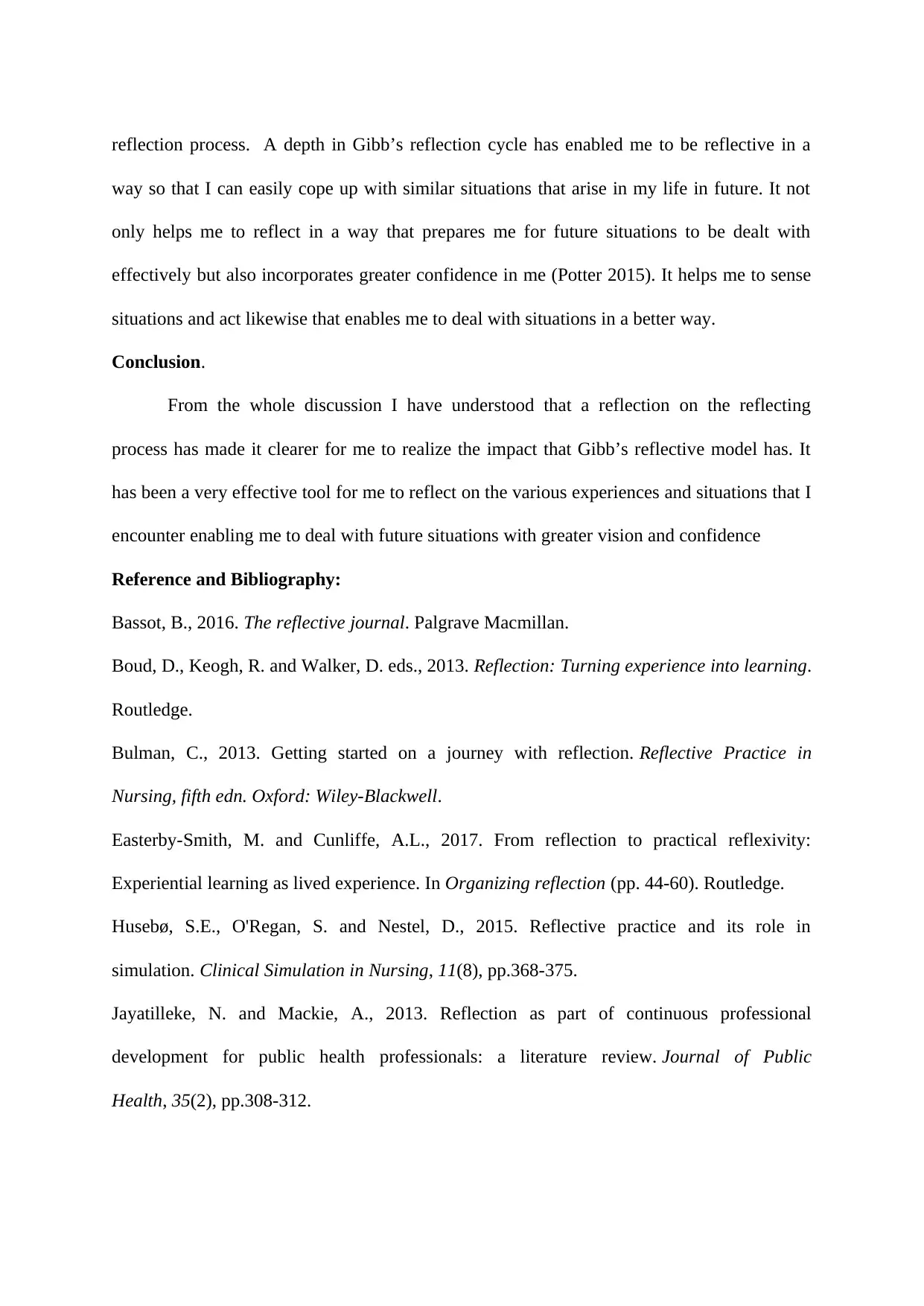
reflection process. A depth in Gibb’s reflection cycle has enabled me to be reflective in a
way so that I can easily cope up with similar situations that arise in my life in future. It not
only helps me to reflect in a way that prepares me for future situations to be dealt with
effectively but also incorporates greater confidence in me (Potter 2015). It helps me to sense
situations and act likewise that enables me to deal with situations in a better way.
Conclusion.
From the whole discussion I have understood that a reflection on the reflecting
process has made it clearer for me to realize the impact that Gibb’s reflective model has. It
has been a very effective tool for me to reflect on the various experiences and situations that I
encounter enabling me to deal with future situations with greater vision and confidence
Reference and Bibliography:
Bassot, B., 2016. The reflective journal. Palgrave Macmillan.
Boud, D., Keogh, R. and Walker, D. eds., 2013. Reflection: Turning experience into learning.
Routledge.
Bulman, C., 2013. Getting started on a journey with reflection. Reflective Practice in
Nursing, fifth edn. Oxford: Wiley-Blackwell.
Easterby-Smith, M. and Cunliffe, A.L., 2017. From reflection to practical reflexivity:
Experiential learning as lived experience. In Organizing reflection (pp. 44-60). Routledge.
Husebø, S.E., O'Regan, S. and Nestel, D., 2015. Reflective practice and its role in
simulation. Clinical Simulation in Nursing, 11(8), pp.368-375.
Jayatilleke, N. and Mackie, A., 2013. Reflection as part of continuous professional
development for public health professionals: a literature review. Journal of Public
Health, 35(2), pp.308-312.
way so that I can easily cope up with similar situations that arise in my life in future. It not
only helps me to reflect in a way that prepares me for future situations to be dealt with
effectively but also incorporates greater confidence in me (Potter 2015). It helps me to sense
situations and act likewise that enables me to deal with situations in a better way.
Conclusion.
From the whole discussion I have understood that a reflection on the reflecting
process has made it clearer for me to realize the impact that Gibb’s reflective model has. It
has been a very effective tool for me to reflect on the various experiences and situations that I
encounter enabling me to deal with future situations with greater vision and confidence
Reference and Bibliography:
Bassot, B., 2016. The reflective journal. Palgrave Macmillan.
Boud, D., Keogh, R. and Walker, D. eds., 2013. Reflection: Turning experience into learning.
Routledge.
Bulman, C., 2013. Getting started on a journey with reflection. Reflective Practice in
Nursing, fifth edn. Oxford: Wiley-Blackwell.
Easterby-Smith, M. and Cunliffe, A.L., 2017. From reflection to practical reflexivity:
Experiential learning as lived experience. In Organizing reflection (pp. 44-60). Routledge.
Husebø, S.E., O'Regan, S. and Nestel, D., 2015. Reflective practice and its role in
simulation. Clinical Simulation in Nursing, 11(8), pp.368-375.
Jayatilleke, N. and Mackie, A., 2013. Reflection as part of continuous professional
development for public health professionals: a literature review. Journal of Public
Health, 35(2), pp.308-312.
⊘ This is a preview!⊘
Do you want full access?
Subscribe today to unlock all pages.

Trusted by 1+ million students worldwide
1 out of 14
Related Documents
Your All-in-One AI-Powered Toolkit for Academic Success.
+13062052269
info@desklib.com
Available 24*7 on WhatsApp / Email
![[object Object]](/_next/static/media/star-bottom.7253800d.svg)
Unlock your academic potential
Copyright © 2020–2026 A2Z Services. All Rights Reserved. Developed and managed by ZUCOL.




